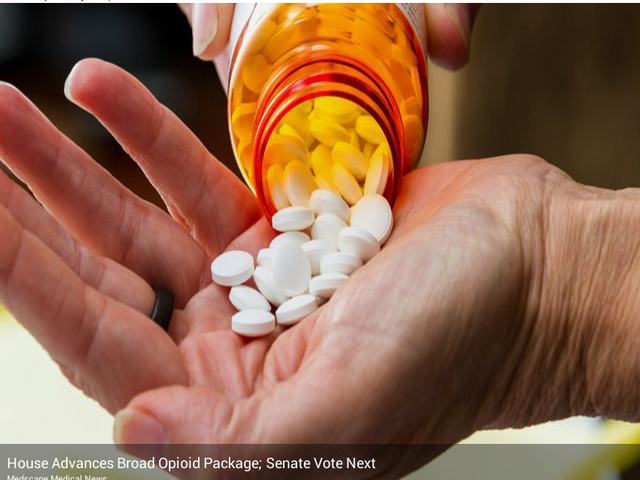House advances broad package;senate vote next
The US House of Representatives today approved a broad package of opioid legislation that's intended to give healthcare professionals and federal agencies new authority and new tasks for combating substance abuse.
The Senate is expected to clear the package in the weeks ahead, as it represents a series of compromises negotiated between lawmakers in the two chambers. The White House has already signaled its strong support for this effort, making it likely that President Donald Trump will sign the package into law.
The president today signed a separate spending bill into law that provides a historic level of funding — $6.6 billion — for efforts to treat and prevent substance abuse.
There's broad bipartisan support to combat substance abuse, as reflected in the 393-8 House vote today on the opioid package. During the weeks of debate on this measure, many lawmakers noted the sharp increase in drug overdoses in recent years. The Centers for Disease Control and Prevention in August said the number of drug overdose deaths in the United States may have reached 72,000 last year, up from an estimated 66,000 in 2016 and 54,000 in 2015.
"We have a lot more to do to address this opioid crisis, which is getting worse instead of better," Representative Frank Pallone Jr. (D-NJ), the ranking Democrat on the House Energy and Commerce Committee on the chamber's floor, said today. Still, Pallone and his GOP colleagues said they were pleased with the package they put up for a vote.
"Seldom can we say that federal legislation will actually save lives, but we know this bipartisan package will do just that by improving treatment for those battling addiction and slowing the flow of illegal, deadly synthetic drugs into America," House Energy and Commerce Chairman Greg Walden (R-OR) said today.
Running to about 660 pages in length, the opioid package sweeps in many proposals offered by members of both parties. Some of these expand the authority of federal agencies to try to stop abuse of prescription drugs and impede the flow of illegal narcotics into the United States. Many other provisions direct the Department of Health and Human Services (HHS) and other federal bodies to undertake further study of ways to combat substance abuse.
The package, for example, would increase the number of healthcare providers who can prescribe or dispense medication-assisted treatment (MAT). It would authorize clinical nurse specialists, certified nurse midwives, and certified registered nurse anesthetists to prescribe MAT for 5 years, according to an Energy and Commerce summary of the bill.
The measure also would allow waivered practitioners to immediately treat 100 patients at a time if a practitioner is board certified in addiction medicine or addiction psychiatry. The bill requires HHS, in consultation with the Drug Enforcement Administration, to give Congress a report that assesses the care provided by physicians treating more than 100 patients and nonphysician practitioners treating more than 30 patients, the committee said.
Representative Michael C. Burgess, MD, (R-TX) chairman of the Energy and Commerce's health subcommittee, said he has concerns about the package's expansion of the ability of healthcare professionals other than physicians to prescribe. He said he hoped Congress would take another look at the issue.
Burgess also expressed disappointment about a measure that was left out of the opioid package. The opioid measure "could have been stronger" if it included the text of a House bill about sharing substance abuse records, Burgess said. He's a supporter of a pending bill that would align rules about disclosure of past substance abuse more closely with the Health Insurance Portability and Accountability Act (HIPAA).
giving out the health issues you deserve, don't forget to send in your upvote and comments
Thank you....
Get more info at medscape.com